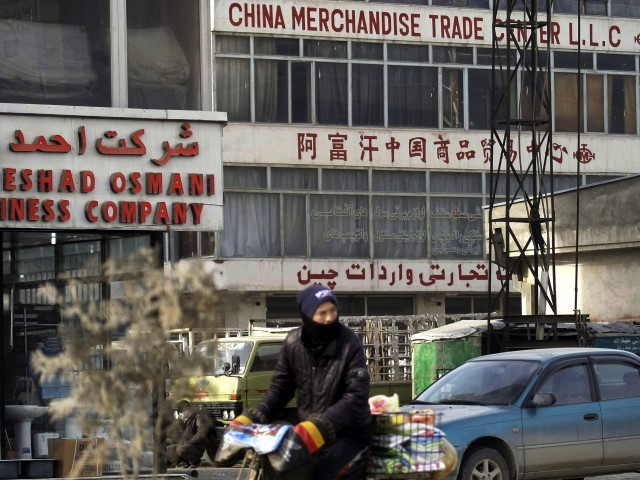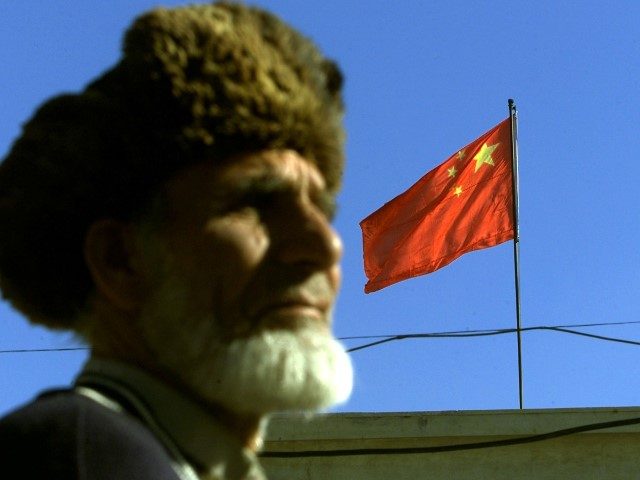A group of Chinese “business representatives” is planning an “expo” event in Kabul, Afghanistan, for April, the Chinese state-run Global Times revealed on Sunday, meant to help China profit off of business under the jihadist Taliban regime.
Taliban officials have repeatedly asserted since taking power in August that they anticipated significant financial backing from the Chinese Communist Party. The Taliban, a jihadist terrorist organization that ruled Afghanistan in the 1990s, took over the country once again last year after President Joe Biden broke an agreement with the group that prompted a national campaign of conquest ending in Kabul. No foreign government has formally recognized the Taliban as the legitimate government of Afghanistan, but the former president of the country, Ashraf Ghani, fled; the Afghan military collapsed; and no significant challenge to the Taliban’s control of the nation exists.
The Chinese Communist Party has referred to the Taliban as an “interim government” in the recent past, suggesting some degree of acceptance.
The Global Times, a mouthpiece for the communist regime, reported that state-backed Chinese businesses (China is a communist country, so all legal business activity is government-controlled) have increased their communication with Afghan traders seeking to deepen ties with the country.
“China and Afghan business interactions have seen an upward trend in recent days, driven by the unleashing of market potential for Afghan agricultural and other related products in China, its largest neighboring market,” the propaganda newspaper reported, citing “business representatives” in China.
The “expo” planned for the spring is meant to create a more “direct” venue for Taliban-approved businesses to engage with Chinese buyers and increase Afghanistan’s trade dependency on China, presumably to the Taliban’s profit. It is also, the newspaper asserted, meant to help the two sides find “deals on complementary goods for each other’s markets.”
“The organizers include a wide range of government and industry representatives, with academicians, traders, producers and investors from both sides expected to participate in the events,” the Global Times relayed. It reported that the event is scheduled to take place in Kabul’s Chinatown and cited locals as excitedly deeming the event “unprecedented.”

An Afghan man rides his bike past a China Merchandise Trade Center in Kabul, Afghanistan. (Musadeq Sadeq/AP)
Li Xijing, identified as the “deputy general manager of China Town” in Kabul, confirmed Taliban involvement in the business expo.
“We have sent invitations to the various Afghan government departments, and they have indicated that they would participate in the meeting at that time … there will be more participants expected,” Li told the Global Times.
The state-run newspaper concluded that, while the expo may bring good news to Taliban-connected businesses seeking to export their products to China, it will likely not address the consistent demands for foreign investment the Taliban has been making to China since it took control of the country.
“[L]ingering concerns such as regional stability and risks from sanctions by the West will remain major hurdles for Chinese investors to do business in the South Asian country, industry experts said,” according to the Times. “It would be more at the level of trade rather than investment cooperation, given that the investment risk for Chinese enterprises in Afghanistan is still relatively high.”
The latter observation the Global Times attributed to regime-approved “expert” professor Yan Wei of Northeast University.
The Taliban has consistently expressed confidence that China would fund its regime. Taliban leaders have also argued that they cannot succeed as a government without significant foreign financial aid.
“China, our great neighboring country, can have a constructive and positive role in the reconstruction of Afghanistan and also in the economic development and prosperity of the people of Afghanistan,” Taliban spokesman Suhail Shaheen said in August, shortly after the Taliban seizure of Kabul. “It is expected [that] China [will] play its role.”
“China is a neighbor and has a strong economy. We are trying to develop trade and economic relations with them,” another Taliban spokesman, Zabihullah Mujahid, said in an interview in October. Mujahid said China appeared interested in investing “billions of dollars” and that the jihadists had “promised them security for their investment and assets.”
On China’s end, its state media enterprises declared the communist state the “real winner” of the Taliban’s return to power in August and has promoted the Taliban as a trustworthy international partner.
“The Taliban have repeatedly expressed their hope to develop good relations with China, and that they look forward to China’s participation in the reconstruction and development of Afghanistan,” Chinese Foreign Ministry spokeswoman Hua Chunying said the day after the Taliban occupied Kabul.
China’s financial support for the Taliban is particularly important in light of the group’s inability to access Afghan government funds. As the Taliban is not a legitimate government, international institutions like the World Bank and International Monetary Fund (IMF) have frozen Afghan assets to Taliban jihadists, and bans in free states holding Afghan money have not allowed the Taliban to acquire it.
“The money belongs to the Afghan nation. Just give us our own money,” Ahmad Wali Haqmal, a spokesman for the Taliban “finance ministry,” complained in October. “Freezing this money is unethical and is against all international laws and values.”
In November, the Taliban wrote an open letter to the U.S. Congress asking for funding.
“It is quite surprising that with the announcement of the new government, the administration of the United States of America slapped sanctions on the assets of our Central Bank,” the letter read in part. “We are of the belief that freezing Afghan assets cannot resolve the problem at hand neither is it the demand of the American people, hence your government must unfreeze our capital.”
Follow Frances Martel on Facebook and Twitter.

COMMENTS
Please let us know if you're having issues with commenting.